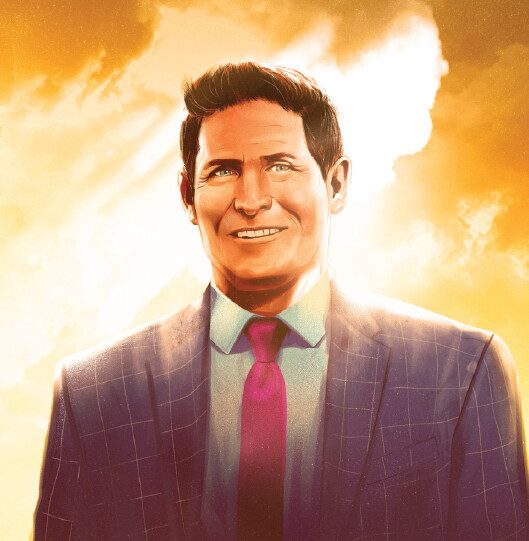The law of love is loving as God loves, seeking another’s healing, expecting nothing in return. This is not new doctrine. But for me, looking at everything through the lens of the law of love was a subtle shift with vast implications. Some of these concepts were hidden in plain sight, right there in the scriptures. Now that I see them, my whole world is changed for the better.
The law of love is different from love itself. How many songs try to define the word love? It can be compassionate, charitable, romantic, sexual—love is a feeling, selfish or unselfish. But the law of love is a governing force. Just like the laws of gravity, physics, and thermodynamics govern this world, the law of love governs all of creation—the heavens and the earth. The law of love is the highest of all the laws. When I seek to live the law of love—when I make it my quest to steer my life by this highest governing power—the law of love can transform everything. . . .
So often I might have tripped on various looming obstacles that I found in my path, sometimes boulder-sized stumbling blocks that came from different directions. I didn’t come across the law of love from a pleasant walk in the park. I dug deep into the law of love out of desperation, trying to find a way forward during some dark times. Focusing on the law of love helped me zero in on what really matters: the perpetual, unchanging principles of love at the core of Jesus’s gospel.

The Law of Love in Business
You wouldn’t think that the professional sports world and the high-stakes world of private equity would be natural springboards into the law of love. But it works everywhere.
Private equity is like the NFL in some ways. It’s a highly competitive, tip-of-the-spear kind of place. The people that are successful in this field are really achievement-oriented in their relationships. But for me, the real question is, how do you make people feel? Sometimes the smartest people understand the science of finance, but they don’t understand human beings. Everyone can benefit from leaning into their ability to understand the human capacity. It really does build lasting success when you develop the softer skills of relationship-building and awareness of others.
My job now is negotiating big acquisitions for our firm. It’s always a multi-dimensional conversation with great complexity. But I’ve learned to see it from a 360-degree perspective.
In private equity negotiations involving billion-dollar transactions, having it out in the boardroom amongst ourselves tends to be a zero-sum kind of experience. I thought to myself, Of all the odd places to try this law of love. But what if I did it in one of these heated negotiations? I decided to try it. It was amazing how someone on the other side often responded. In a way, you are vulnerable and can be taken advantage of, but taking that position can also attract those folks who are willing to collaborate. I’ve found that most people will tend to seek common ground if given the opportunity. The more I did it, the more success I had. All of a sudden, I wasn’t looking for the last dollar.
▶ You may also like: How Steve Young saw NFL player Reggie White living the law of love on the football field
Mayhem in the Boardroom
I’m no expert in the law of love; I’m in process too. I’ve got blood on my own hands here. Early on, before I understood much about these principles, I had an experience with a business owner I’ll call Michael. My private equity firm bought the business from him, and we had some very difficult conversations around control, essentially. I had taken the perspective that only one person can be in control. If there wasn’t a quarterback, things would devolve—and the quarterback needed to be the new CEO we hired. After we bought his business, Michael agreed that he would take a role as the chairman of the board and wouldn’t be involved in the day-to-day operations anymore.
But Michael kept hanging around the business. Finally the new CEO called me and said, “Hey, this guy is driving me crazy.” I had to call Michael and ask him to back off and give the new management some breathing room.
Michael answered, “Well, what do you want me to do? I can’t even walk around?”
I said, “Look, in the end, it’s about people giving people space. You’re so dynamic and such a strong person and . . .”
Michael said, “OK, OK.”
Then about a month later, the CEO called me and said, “Look, it’s either him or me.”
I said, “Michael, we’ve got to meet. Let’s get together.” We met in the boardroom, without the CEO. I went into it thinking, the CEO said he can’t work with this guy, and because the CEO didn’t see any place for Michael to contribute, I didn’t see a place for Michael to contribute either. I looked at it as a zero-sum game.
So I said, “Michael, you’ve got to go.” And that created an argument. I have had very few arguments in my life, but this was an argument that escalated to the point where Michael picked up a chair and threw it at me. He wasn’t necessarily aiming for me, and he didn’t mean to hurt me, but he threw the chair in frustration and anger.
All it was, in the end, was an inability to see each other’s point of view. It didn’t have to be a zero-sum game; there was a place to work through this very easily. I saw only winners and losers. The winner was the CEO, so the loser had to be Michael, right? I saw no other way around it. I didn’t have the four power words to lay onto the situation: gentleness, meekness, long-suffering, love unfeigned [see Doctrine and Covenants 121:41].
But I knew that throwing a chair wasn’t where I wanted the conversation to end. Our argument could have stopped the conversation at a standoff right there. Or I could have chosen to escalate it further. But I wanted to find common ground—I think we both wanted that. I knew we just had to keep talking until we found that common ground.
Once it got dramatic, I realized it was time to slow down and get to the root of it, to find out what was really wrong here. When the chair went flying, I was initially startled. But then my reaction was almost cheery: “Really? That’s all you’ve got?” Michael took a deep breath and cracked the slightest grin (a little embarrassed, but still plenty frustrated). We looked at each other. Then I said, “OK, now what are we going to do? Let’s try to figure out what is driving this.”
And so we continued the conversation. I listened. Michael talked. Eventually he said, “Having this back-and-forth discussion with you, I just now realize that I either need to run the business, or I need to leave the business. It’s how I am; it’s who I am. I can’t be the chairman. I have to be in the business all the way, or I have to be out of it.” Continuing the conversation got Michael to a peaceful place where he could feel good about it. In the end he realized that being out of the business altogether was really the best place for him as well as for the business.
Even now, 10 years later, Michael and I stay in close contact. He’s traveling the world. He calls me from the four corners of the earth, sailing the oceans, sending me pictures of him holding his baby granddaughter. He often says, “Steve, letting go of the business was the best thing that ever happened to me. I’m so grateful.” I tease him that he thinks he’s now a tremendous golfer. His family is traveling together, and they’re closer than ever.

I went about it wrong, but eventually we found that place of peace because we continued the conversation in patience. In other words, inadvertently I ended up being long-suffering, with gentle persuasion and meekness. Even love. Not the warm fuzzy kind of love, but respect, being willing to try to stand in his shoes to have some empathy. It took a chair flying before I woke up and asked myself, “How can I bring healing to this situation?” Even before I understood about the law of love, there were elements that I enacted unawares that helped find a good ending for everyone: the company, Michael, and the new CEO.
This is how the law of love works. It works in high-pressure senior executive situations, where the professional stakes don’t get any higher. If the law of love can help resolve conflict at the senior CEO level with a new buyer coming in, then the same principles can apply to the whole organization as well as individual lives.
▶ You may also like: The surprising reason Steve Young didn’t serve a mission (and it has nothing to do with football)
Law of Love
The law of love—loving as God loves, seeking another’s healing, expecting nothing in return—is a simple principle with profound, life-changing implications. How can we live the law of love? Steve Young shares insights from his own multifaceted life as well as from others who are scientists, fellow Latter-day Saints, Anglican, atheist, Baptist, Catholic, Confucian, Hindu, Jewish, Muslim, and secular people of wisdom, as well as from the scriptures. This practical book may shift your mindset to a more expansive worldview that just might change everything. Whether in football, work, church, or family, the law of love is undefeated. Available at Deseret Book and deseretbook.com.
Watch a special from Steve Young in the player below.


